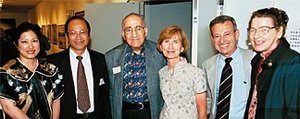A groundbreaking complementary and alternative medicine (CAM) conference was hosted by the University of California, Irvine College of Medicine and the Susan Samueli Center for Integrative Medicine Sept.
The conference was the first of its kind to be cosponsored by both Western-oriented and complementary and alternative institutions. The size and scope of the consortium of integrative medicine professionals who attended the meeting was unprecedented, and the conference's sponsors hope that having the meeting at the UCI campus will generate higher profiles for CAM and integrative medicine, which are still struggling to gain inclusion into more conventional medical fields.
 Participants at the integrative medicine conference included (from left): Dr. Peng Li, Dequan Ren, Dr. Thomas Cesario, Christine Nakamoto and Daniel Hsu.
"Our goal is to raise the image and awareness of integrative medicine by providing forums for education such as this conference and other programs we maintain," offered Dr. John Longhurst, the associate dean for programs and development at the college of medicine, and acting director of the Samueli Center. "We offer educational opportunities that equip practitioners and laypeople with a new understanding of acupuncture, giving them evidence-based support for these ancient healing arts."
Participants at the integrative medicine conference included (from left): Dr. Peng Li, Dequan Ren, Dr. Thomas Cesario, Christine Nakamoto and Daniel Hsu.
"Our goal is to raise the image and awareness of integrative medicine by providing forums for education such as this conference and other programs we maintain," offered Dr. John Longhurst, the associate dean for programs and development at the college of medicine, and acting director of the Samueli Center. "We offer educational opportunities that equip practitioners and laypeople with a new understanding of acupuncture, giving them evidence-based support for these ancient healing arts."
Thanks to a $5.7 million grant from the Samuelis, UC Irvine has introduced lectures on integrative medicine into the college of medicine's regular curriculum, and added more research in the field of traditional Chinese medicine, specifically in acupuncture. Longhurst stated that UC Irvine is doing more research on acupuncture than any school in the University of California system, and possibly anywhere else in the United States. Current research funded by the Samueli's grant includes study of the mechanisms of how acupuncture works; observations of the importance of acupuncture's effects on cardiovascular health; brain imagery in acupuncture; and the influence acupuncture has on hypertension. The Samueli Center also helps the UCI College of Medicine host a monthly seminar series on a variety of CAM topics, community lectures two to three times a year, and large scientific conferences (including the recent CAM conference in September).
Funding for the meeting was supplied through the Samueli grant, with additional support from a well-known manufacturer of Chinese herbal formulations. "We're excited to assist in a more universal understanding of the importance of integrative medicine," remarked Chris Nakamoto, the chief executive officer of Sun Ten Laboratories. "This conference could help create the momentum that integrative medicine needs to further bind Eastern and Western medicine together in a powerful partnership."
Among those who presided over discussions at the conference was Dr. Ji-Sheng Han, founding president of the Chinese Association of the Study of Pain (CASP) and developer of an acupoint nerve stimulator, who is often considered the "father of modern acupuncture research." Dr. Han delivered a lecture entitled "Electroacupuncture Treatment for Drug Abuse: Recent Advances," which was very well received.
The three-day conference covered various aspects of integrative medicine. Day one of the conference highlighted the role of Chinese herbal therapy in cancer treatments and the latest methods for identifying new, potentially beneficial plants. Day two focused on advances in electroacupuncture and the use of acupuncture in the treatment of hypertension and cardiovascular health. Day three rounded off the conference with discussion of both acupuncture and herbal therapy as they relate to immune modulation. Each afternoon featured a panel discussion with the featured speakers.
Three special lectures were open to the general public during the conference: "Is There Still a Role for Plant-Derived and Herbal Medicines in the 21st Century?" by David S. Seigler, a professor in the Department of Plant Biology at the University of Illinois and curator of the University of Illinois Herbarium; "Methodological Considerations in the Study of CAM Focusing on Women's Health" by Adriane Fugh-Berman, assistant clinical professor at the Department of Medicine and Health Care at George Washington University School of Medicine; and "The Role of the Office of Dietary Supplements at the National Institutes of Health" by Paul Coates, director of the Office of Dietary Supplements for the NIH.
Also discussed were the future directions and health care practices for the role of integrative medicine and CAM in medical education and health care practices. The Samueli Center has planned to host a satellite conference focusing on acupuncture as part of a larger conference on physiology, slated for San Diego in 2005.

"It's important for acupuncturists to attend these kinds of meetings," said William Flanagan, LAc, Dipl.Ac., CH, a conference attendee with a practice in the Irvine area. "As acupuncture integrates more with Western medicine, we need to find a common language between the two medical arts and to be open about our results."
"Because of research like what's going on at the Samueli Center, alternative medicine is coming into its own," Flanagan continued. "Both types of practitioners are starting to collaborate and refer to each other more, and we need to remain open to the possible explanations that each side has to offer. It's a very exciting time to be a practitioner."
For more information on the Samueli Center, contact:
Heidi Barrett
University of California, Irvine
Susan Samueli Center for Complementary and Alternative Medicine
1034 Hewitt Hall
Irvine, CA 92697-5850
Tel: (949) 824-5763
Acupuncture Today editorial staff members research, investigate and write articles for the publication on an ongoing basis. To contact the Editorial Department or submit an article of your own for consideration, email mailto:
.



